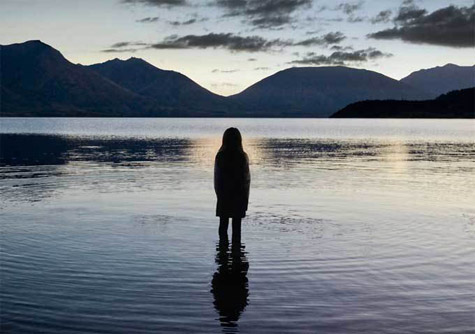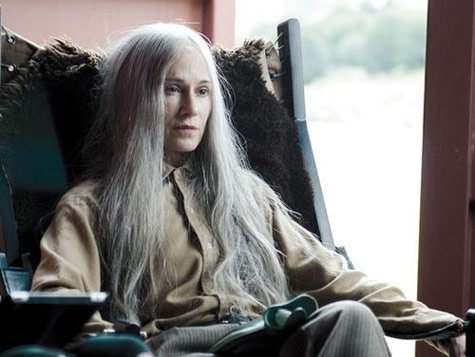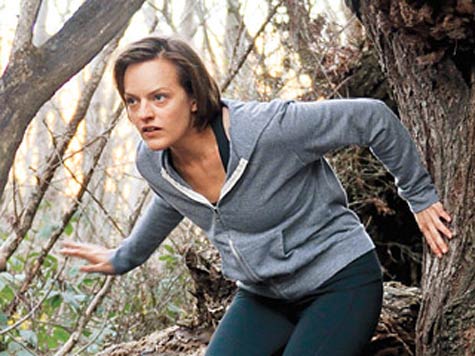
Jane Campion is a badass. The New Zealand writer/director has always been fearless in her portrayal of characters pushed to their psychological extremes. More to the point, she’s always had an extraordinary ability to harness that fearlessness and bring it to the screen. It’s one thing to have the vision, it’s another thing to have the talent to turn that vision into art. In films like the brilliantly moving Angel At My Table (still, to my mind, her best film), The Piano, and Holy Smoke! she’s obsessed with taking her characters far beyond their own ideas of themselves. A Campion protagonist (usually, but not always, a woman) will be broken down and taken apart before reaching the end of the story.
Her latest film, the BBC miniseries Top of the Lake, aired just a few weeks ago in the U.S. A labyrinthine crime story set in a close-knit (read: deeply dysfunctional) New Zealand mountain town, Top of the Lake follows a police detective name Robin Griffin who has returned home to see her mother through the final stages of cancer, but shortly after arriving in town she is drawn into the disappearance of a pregnant 12-year old girl named Tui. To complicate matters, Tui is the daughter of a local drug lord named Matt Mitcham, who moves about the mountains and the town as if everything, and everyone, belongs to him.
As Robin searches for Tui, she is forced to confront the secrets of her past. Robin has her own dark history—a history tied to Matt Mitcham’s estranged son, Johnno, as well as to the head of the local police station, Detective Al Parker. In true Campion fashion, she has to essentially deconstruct what she knows of herself before she gets to the end. Who is responsible for Tui’s pregnancy? Is Tui still alive? What is the story behind the strange, makeshift compound of American women who have taken up residence in a field near Matt Mitcham’s drug lair? And what does all this have to do with Robin and the horrible trauma she endured as a teenager—the same trauma, we gather, that drove her to become a detective specializing in sexual abuse cases?
Throughout Top of the Lake the threat of sexual violence hangs in the air like the mist that drifts across mountain peaks in the distance. This pervasive sense of unease—no, not just unease, it’s more like a queasy dread—creates an odd mix of tones. On a purely visual level, the film is breathtaking. New Zealand is justifiably considered one of the most beautiful places on earth, and Campion and her cinematographer Adam Arkapaw (Animal Kingdom) capture the mountains and the valleys and the water in rich, glorious detail. And Campion gives us moments of humor, many of them involving the women’s compound run by a spiritual guru played by Holly Hunter—as well as set pieces of suspense like Robin’s showdown with a child molester in the woods.

The challenge of Top of the Lake, however, is that there’s something permanently unsettling about a mystery involving child abuse. It renders the solution of the mystery a thing to be endured, a depressing anecdote of sexual violence, rather than a riddle to be solved. Hundreds of years of murder mysteries have long since dulled our sensitivity to fictional homicide, but sexual abuse remains a sickening crime—one that conjures our disgust rather than our puzzle-solver’s sense of playfulness (this is why murder mystery cruises and dinner theaters are unlikely to be replaced by games of let’s-catch-the-pederast). Top of the Lake is beautifully made, but it doesn’t propel along across its seven hours. You proceed from episode to episode with interest rather than expectation. It’s done well, but its not exactly fun, even in the usual pitch-black noir sense of fun. It’s more like reading a true crime report about rapists and child molesters.
I hope that doesn’t sound like I’m trying to run off potential viewers. The series is attempting to probe some deep areas within the context of a mystery story. It’s sharply written, and (as is usually the case with any good film) it owes much to its cast.

As Robin, Elisabeth Moss proves yet again that she’s one of the best actors we have today. She’s certainly one of the most compelling screen presences on television—though it’s difficult to tell how much of this is due to her obvious talent and how much is the effortless projection of her innate personality. (This is true, by the way, of most great stars. It’s hard to know where the conscious manipulation of the natural charisma begins and ends.)
Reportedly, Campion wanted her Piano star Anna Paquin to play Robin, but Paquin had to decline because of her pregnancy. With all due respect to Paquin, it’s difficult to imagine Top Of The Lake without Elisabeth Moss’s haunted blue eyes—they always seem to be revealing a sense of fearful resolve, an endlessly interesting conflict between damage and determination. You see this on Mad Men, with Moss’s Peggy Olson slowly coming into an understanding of her own abilities and prospects. Here, the character works the other way. Robin starts out strong and sure (her showdown with the child molester in episode 2 is thrilling in large part because of Moss’s swift physical assurance), but as the case goes on it wears her down. Revelation after revelation strips her of her armor. Like a true Campion badass, though, she perseveres.
Jake Hinkson, the Night Editor, is the author of The Posthumous Man.
Read all posts by Jake Hinkson for Criminal Element.

PS: The series is currently available on Netflix.
Like the piece, Jake, and totally agree that Jane Campion is a badass. Well-put. There’s a long weekend coming up and this might be the perfect time for me to sink into this on Netflix.
Speaking of Netflix, the first seasons of [b]Copper[/b] and [b]Longmire[/b] have just been added. And there’s a whole bunch of Swedish mysteries that have been tossed up as well.